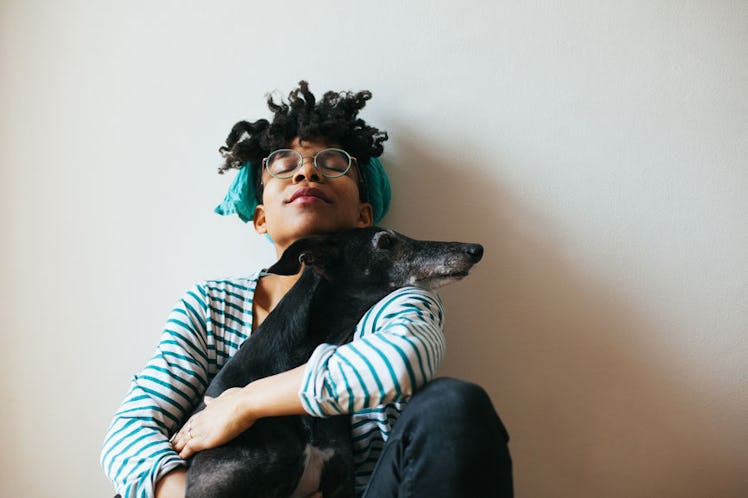
Big Dogs Might Be Smarter Than Little Pups, But Science Says There's A Catch
My first pet was a sweet Beagle mix named S'mores. After S'mores passed, Hank, a hound mix, came into my life. While I love each pup for their amazing qualities, I have to admit that S'mores' tiny mind seemed to be much more intelligent than Hank's decidedly larger one. She could escape from any enclosure, and seemed like she could genuinely understand what I was saying. Hank, on the other hand, has trouble escaping from under a towel. But in general, are big dogs smarter than little dogs? It's complicated, but according to the results of a new study, the teacup-sized pooches of the world might be at a slight disadvantage, at least by some measures of intelligence.
The study, published in the scientific journal Animal Cognition, found that larger dogs (who technically have larger brains) tend to perform better than smaller dogs on certain intelligence tests. According to a press release from the University of Arizona, the study was conducted based on data from 7,000 purebred dogs of 74 different breeds, whose brain sizes were estimated based on typical sizes for the breed. All in all, the research found that larger dog breeds tend to show better short-term memory and self-control than their tiny counterparts, which could indicate higher levels of intelligence in those areas.
This isn't the first time that researchers have discovered results like this: A 2010 study published in the scientific journal Behavioural Processes also found that larger dogs seem to be better at reading and following human cues than smaller dogs, which the researchers attributed to differences in both vision and in breeding.
While it's certainly hard to argue with the science of it all, Russell Hartstein, CDBC, CPDT-KA, a dog trainer, behavioralist, and CEO of Fun Paw Care, says it's important to always see your dog as their own being rather than just the result of their breeding. "It is imperative to remember that all animals (human and nonhuman) are individuals, so to classify a breed as 'intelligent' would not be correct or a good idea," he tells Elite Daily. Having said that, Hartstein says there is some truth to the idea that, in general, some dog breeds are more likely to do well at certain tasks than others. "Some breeds have the propensity for not only remembering and executing protocols and training exercises more efficiently than others," he explains, "but also are more motivated to do so."
So what actually determines whether a dog is "smart" or not? "Intelligence among canines is usually determined by how quickly they learn and follow commands," says Dr. Jennifer Freeman, DVM, PetSmart’s resident veterinarian and pet care expert. "There are dog breeds that have demonstrated this quickness, such as Border Collies and German Shepherds," she tells Elite Daily in an email. In general, Dr. Freeman explains, these larger breeds catch on to new skills more quickly than small-but-mighty pups. "Different dog breeds were created for different skill-sets, so not all breeds will react to training the same way or learn certain tricks as quickly as another might," she says.
That being said, according to Dr. Freeman, there are three main types of dog intelligence, so if your pooch isn't so great at one kind, she might be more gifted in another category. "Instinctive intelligence refers to what a dog was bred for," the veterinarian explains. "Different breeds have different types of instinctive intelligence." But adaptive intelligence — what a dog can learn by herself through experience in her environment, says Dr. Freeman — isn't as breed-specific. Lastly, there's working and obedience intelligence, which is what your pup can learn from you or a trainer, Dr. Freeman explains. If you're the proud dog mom of a teacup poodle, don't worry too much about whether she's instinctively smart. Instead, practice different commands with her until her "vocabulary" expands, suggests the veterinarian.
If you're eager to teach your pup lots of new tricks, go for it. It will probably be a fun time for the two of you to interact and bond. But Hartstein explains that it's crucial to remember that an animal’s ability or “intelligence” is also reliant on the environment and the teacher's ability and skill. In other words, if teaching your dog new tricks is really important to you, then you might want to seek guidance from an actual trainer before assuming she can't learn because she's, by your estimation, not that smart. "Training is an art and a science," says. Hartstein "Knowledge is not the only factor. Execution, motor skills, timing, and mechanics are equally important."
Look, whether your cutie pie is enormous or tiny, forgetful or has a good memory, smart as a whip or not quite as sharp, I'm sure you love her just the same. After all, who ever loved a dog only because she was smart? I'm willing to bet that your fur baby is amazing because of their unconditional love, not their ability to learn tricks.